Two strangers met in Berlin. Here’s how they ended up having ‘three weddings’
Suki Sandhu always insists Manuel Heichlinger “made a beeline” for him that first evening in Berlin.
When Manuel entered the Kaefer restaurant, a rooftop spot on top of Germany’s Reichstag parliament building, Suki noticed him right away.
“I saw him walk in and I thought, ‘He’s quite hot. He’s quite handsome. That must be someone from the German office,’” says Suki. “But I always ignore the hot guy – I’m like, they probably already get enough attention as it is, just ignore them.”
Suki genuinely had no intention of speaking with Manuel that night. But the next thing he knew, Manuel had unexpectedly made eye contact with him. Then, more unexpected, Manuel was smiling at Suki.
And then – Suki truly couldn’t believe it – Manuel was crossing the room, walking in his direction. Suki held his breath.
A rooftop meeting
It was March 2006. Suki was a 25-year-old consultant at a London based recruitment company. In fact, he was the company’s global top consultant. And the organization had a quarterly incentive where they’d whisk the top performers away for a glitzy weekend in a European city.
“Whoever was successful from the UK was flown out, put up in a five star hotel and there was a whole programme of fun-filled activities,” recalls Suki.
One of the activities was the Reichstag banquet dinner. And a bunch of colleagues from the company’s Berlin office were invited along too, among them Manuel Heichlinger, a 28-year-old recent joiner.
Manuel nearly didn’t go that night. The London colleagues were strangers to him. He was feeling a bit rundown, worried a cold might be incoming. But at the last minute he rallied.
“I thought, ‘It’s a good opportunity.’ Plus, it was in a really fancy restaurant. I was like, ‘Okay, I’ll just go, it’s a free dinner. Let’s do that. And then I can go home early.’ Basically, that was the plan,” Manuel tells CNN Travel today.
For what it’s worth, Manuel “totally denies” making a “beeline” towards Suki.
“I definitely did not make a beeline for him, I just walked in,” says Manuel.
But Manuel admits he did notice Suki right away. And he did end up standing by him during the drinks reception – that’s when they first introduced themselves.
“I thought, ‘Oh he’s cute,’” recalls Manuel. “And then I did make sure I was sitting next to him at the table, that I agree with.”
“A beeline,” repeats Suki, knowingly.
The restaurant was arranged into several long banquet tables. Suki and Manuel sat together, rubbing shoulders, chatting.
Suki felt like Manuel was being “super attentive”: he was making lots of eye contact, asking Suki lots of questions. Suki wondered if Manuel was gay – and whether Manuel knew that Suki was gay.
Suki was out, at least he was out to all his colleagues – and to his large group of London friends. But he’d never been open about his sexuality with his family – in Suki’s large Indian Sikh family, sexuality was never talked about.
Suki had never known how to broach the topic with his family. That said, he’d also never had a long-term relationship, so there’d never been any specific need to be candid with his parents.
“But I was pretty happy, as I was just having lots of fun,” says Suki. “I mean, I was feeling on top of the world, pretty invincible in my job. I loved what I did career wise, helping candidates and clients. I was really good at it. And actually, I generally felt quite happy with being single.”
As dinner was served, Manuel and Suki carried on talking. The intense eye contact continued.
Another of Manuel’s coworkers, who’d drunk several glasses of wine, was listening in to their conversation.
“Manuel,” she said, suddenly, her glass wobbling slightly in her hand. “You’re gorgeous. Are you single?”
A few other people stopped what they were doing and started listening too.
“I am, actually,” said Manuel.
“Ooh great,” said Suki’s colleague. “So do you like boys or girls?”
Suki recalls being taken aback by her directness.
“Remember, this was 18 years ago,” Suki says today. “LGBTQ+ rights and humanity and equality was very different.”
But Manuel didn’t miss a beat.
“I’m gay,” Manuel told Suki’s colleague – and by extension, the whole table, most of whom had now tuned in to listen. “I like men.”
“Then, everyone looked at me,” recalls Suki today. “As the only gay guy on the trip.”
Manuel didn’t mind the question – he was happy to share his sexuality, all his Berlin-based colleagues knew.
“I was also in that space of my life where I just didn’t really care what other people were thinking about it,” he says.
Plus, getting the facts out in the open meant it was now obvious to Suki and Manuel what was happening between them. There were no questions about it, they were openly flirting.
“We chatted away, we flirted the night away,” says Suki.
At one point Suki went to the bathroom and texted a friend:
“I’ve met a really cute guy on the trip,” he typed. “From the Berlin office.”
Little did Suki know that Manuel had also sent a friend a similar message.
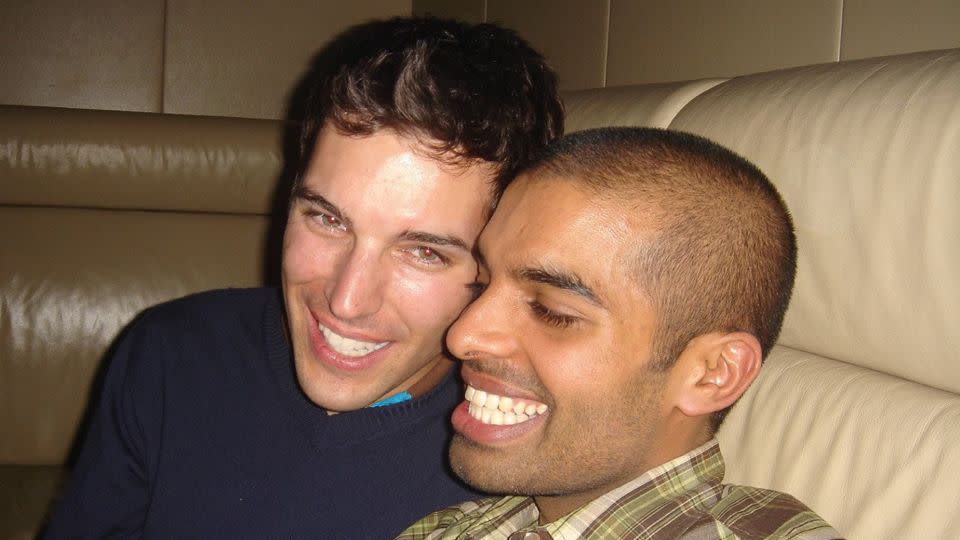
The drinks continued to flow. Dinner finished. Suki, Manuel and a bunch of their coworkers continued the evening in a club.
“We were dancing, snogging [kissing] on the dance floor – probably inappropriate with work colleagues,” Suki recalls. “Then I invited him back to the hotel. We made the most of the hotel, let’s put it that way.”
The next morning, Suki and Manuel stood at the window of the hotel room, looking out over Berlin.
Suki figured the evening was just a “fun, one night stand type thing.”
But then Manuel turned away from the window and looked straight into Suki’s eyes.
“I would really like to see you again,” Manuel said. “Can I take your number?”
The work section of Suki’s trip was finishing up, but he’d already planned to extend his time in Berlin for a couple of days with a friend. Suki figured seeing Manuel again would be fun, so he agreed to meet Manuel at a party that evening.
“So he basically met all my best friends on the second date,” says Manuel. “Which is very unusual, because usually you introduce somebody to your best friends months later, but it just so happened. I didn’t really think about it, it was just very natural.”
“We had loads of fun,” recalls Suki. Once again, the evening ended with him and Manuel “snogging in the corner like teenagers”, as Suki recalls it.
Suki and Manuel arranged to meet again the next day, for brunch. But Suki and his friend got waylaid at Berghain, the famous Berlin nightclub.
“Me and my friend headed to Berghain at noon and we didn’t end up leaving until about four in the afternoon the next day,” says Suki. “What happens in Berghain stays in Berghain, obviously, so I’m not going to talk about that. And this was 18 years ago, I was a lot younger. But we had the best time, it was my first time going and it was so much fun.”
And rather than being mad that Suki missed brunch, when Manuel heard Suki and his friend had finally left Berghain, he simply appeared at the hotel with McDonald’s in hand.
“He knew we’d be starving, having been in this club for 16 hours,” says Suki. “I was like, ‘He’s a good one.’ And obviously my friend really liked him as well.”
On Suki’s last day, he and Manuel met for a final lunch. They left things between them open-ended. They had each other’s contact details. They figured they’d probably be in touch.
“Then we just started calling each other – we had conversations that week on the phone or by text,” says Manuel.
And in one of those conversations, Manuel was direct:
“If you want me to come to London, just say it, and I’ll book a flight next weekend,” he told Suki.
“Yes,” Suki replied. “Come to London.”
And so a week later, Manuel visited Suki in the UK. On one of the evenings, Suki organized a dinner with his closest friends so they could give Manuel “the once over.”
Suki wanted his friends to meet Manuel. But he also briefed them in advance that he didn’t know where the connection was going to go – he figured it would fizzle out.
“I was a little bit like, ‘I’m not sure I want to have a long term relationship. It’s great fun, he’s really lovely. But he’s too nice,’” recalls Suki. “I was used to a bad boy – we always go for the bad boy, not the nice one – and he is really lovely.”
But halfway through dinner, one of Suki’s friends pulled him aside.
“Suki, what the hell are you doing?” she said. “This guy worships the ground you walk on. Give him a chance.”
Her words resonated with Suki. At the end of the weekend, he and Manuel got the bus together to London’s Liverpool Street Station, where Manuel was set to catch a train to the airport. As the bus pulled to a stop, Manuel turned to Suki and said he wanted the two of them to date seriously, to be exclusive. Suki, reflecting on what his friend had said the night before, agreed.
“I gave him a chance,” says Suki.
“And so that was that,” says Manuel.
Long distance
Over the next two years, Suki and Manuel took it in turns to visit one another in London and Berlin.
“It helps because I’m very German, so I’m very organized – we’d plan our trips six months in advance,” says Manuel.
Suki, who’d never been in a long term relationship, found long distance was a good way of easing into this new state of being – at least at first.
But by the end of the two year period, both Suki and Manuel struggled with saying goodbye.
“I used to hate flying back on the Sunday, because it was just so depressing whilst we were saying goodbye – but also just the actual route and journey of traveling home was just exhausting,” says Suki.
By then, the couple were working towards a goal: Manuel was going to move to London.
“I wanted to get to a certain level in my career in Germany that would allow me to make an easier transition into the UK,” says Manuel. “I said, ‘I don’t want to move to the UK just for love, because it will put a lot of pressure on our relationship.’”
Eventually circumstances aligned, and Manuel got a job in the UK. And in April 2008, just over two years since they’d first met in Berlin, he moved into Suki’s house in east London.
“This was a newly renovated house,” recalls Suki. “And he came in with all these boxes. I remember having these heart palpitations, ‘Oh my God, he’s actually moving in. And the house is a mess.’”
It didn’t help that Manuel arrived with what Suki calls a “really uncomfortable German sofa.”
“It was a sleeping sofa, it was very practical,” insists Manuel.
“It was terrible,” says Suki.
But couch disagreements aside, Suki and Manuel were excited to be together at last. They settled into a routine. It felt like a new chapter of their life together.
Family ties
Suki had met Manuel’s family the year before. Despite language barriers, they’d all had a great time together (“My mum for some reason, got really drunk – and Suki as well,” recalls Manuel, laughing.)
Suki wasn’t convinced that a version of that meeting would ever happen the other way round. But he wanted his family to at least know about his relationship, given he and Manuel were now living together.
“That, for me, was my signal to make sure my mum and dad – particularly my mum – knew about me being gay,” says Suki. “The last thing I wanted is them coming to London and me having to hide him, or hide photos.”
Suki, who is one of three kids, enlisted the help of his sister, who knew about Manuel and was supportive of the relationship.
The siblings suspected their mother’s “only perception of gay people was what she watched on ‘Eastenders’” – a British soap opera.
“She watches that religiously every day,” Suki explains.
But this thought sparked another: Suki and his sister decided to arrange a movie night with his mother, with the idea they’d watch a film that spotlighted a gay relationship, which would then pave the way for Suki talking about his own life.
The siblings arranged for Suki’s mother to come and stay one weekend when Manuel was out of town. They even had the perfect movie in mind:
“There was a Hindi film, a Bollywood film, at the time, that had a gay storyline – a comedy gay storyline, called ‘Dostana,’” says Suki.
But the plan was thwarted when Suki’s mother, exhausted from a day of sightseeing in London, retired to bed early.
Nevertheless, the next day Suki broached the topic with his mother. As they sat on opposite ends of the coach, Suki told his mother he was gay, and in a committed relationship with a man.
“She was really upset,” says Suki. “She was really tearful. She was like, ‘Well, you can still get married,’ and I was like, ‘I will, but not to a woman.’”
Over the next few weeks, Suki’s sister helped his mother “understand the situation, giving her resources and tools to read,” as Suki recalls it.
Things remained complicated, but Suki was glad he’d been honest. He knew it was the right decision, both for himself and for Manuel.
A Barbados engagement
As for Manuel, the move to London also sparked a period of reflection. Moving to another country was a sign of his long term commitment to Suki. He saw the relationship going the distance.
The next step, Manuel decided, was to propose. And so towards the end of 2008, on a trip to Barbados, Manuel surprised Suki with a ring.
“We had this lovely little balcony overlooking the beach and the sea. It was very romantic,” says Manuel. “I planned the whole thing in the morning, got a bottle of champagne…”
Despite the romantic set up, Suki was surprised by the proposal. In fact, when Manuel asked the question, Suki wondered, for a moment, if it was all too soon – they’d only been together a couple of years. And gay marriage had yet to be legalized in the UK or Germany, so it was unclear when they would actually be able to get married. Even though Suki had assured his mother he’d get married one day, it was something he’d grown up assuming was out of reach, and he still struggled to imagine it happening.
But Suki knew he wanted to be with Manuel – marriage or not. They loved each other. Overjoyed, Suki said yes.
Back in London, the couple planned a big celebratory engagement party at Milk and Honey, a since-closed private member’s club in Soho.
And while a wedding wasn’t on the cards, the couple organized a civil partnership ceremony on July 16, 2010 at Shoreditch Town Hall, in east London, followed by rooftop cocktails at another swanky private member’s club, Shoreditch House. The couple and their guests concluded the evening with dinner at what Suki calls “one of the hottest restaurants in London at the time,” the since-closed Les Trois Garcons.
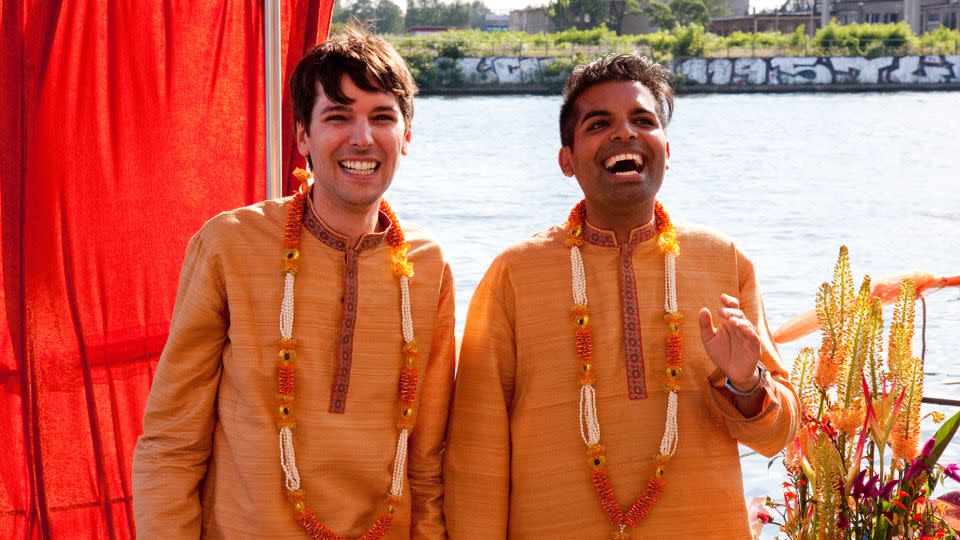
Then, exactly a year later, on July 16, 2011, Suki and Manuel renewed their vows in Berlin, Germany, at a “really beautiful space” on the water.
The couple had set the bar high with their London celebrations, but they went all out with the German festivities. Suki and Manuel arrived at the venue by boat, while over 100 of their friends and family cheered them on.
“There was an ‘Indian Summer’ theme, because of my Indian heritage,” says Suki. “The guests all dressed in Indian attire.”
But, as Suki puts it “it wouldn’t be our wedding if we didn’t have costume changes. So we had three different outfits for the night.”
Suki and Manuel’s friends and family were also encouraged to switch up their clothing during the night if they wanted to.
Other highlights included Suki’s brother and sister giving a speech which Suki calls “absolutely hilarious and amazing.”
And the evening ended in the early hours of the morning with Suki and Manuel attempting the “Dirty Dancing” lift, while “(I’ve Had) The Time of My Life” blared across the dancefloor.
It was hard to imagine how this riotous, joyous celebration could ever be topped. But a few years later, gay marriage was legalized in the UK, and Suki and Manuel decided to convert their civil partnership into marriage.
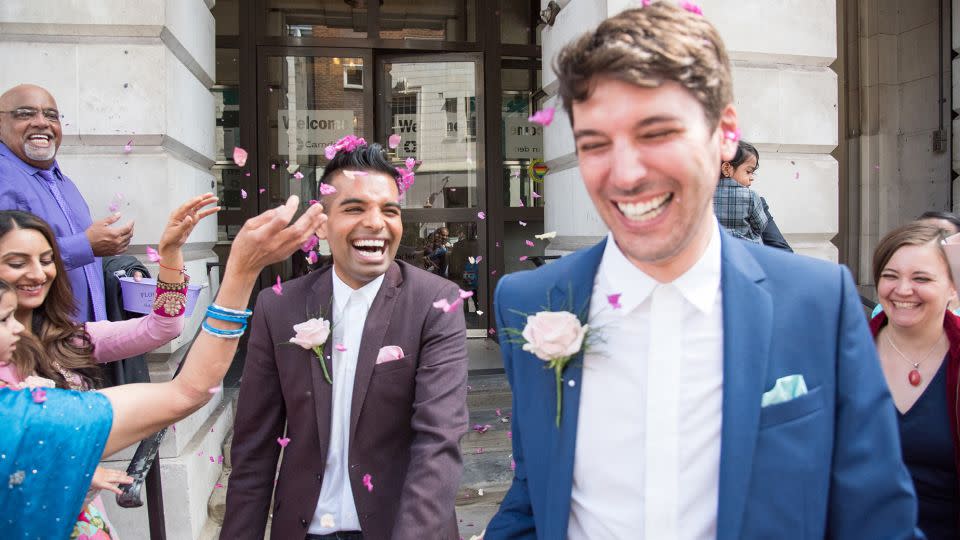
On July 16, 2016, Suki and Manuel “got married for the third time,” as they put it. These celebrations took place at the five-star Andaz Hotel on Liverpool Street, in London – the street where Suki and Manuel first decided to become a couple.
Once again, there were “three or four outfit changes.” There was more dancing – this time Suki, Manuel and their friends choreographed a flash mob to the Justin Timberlake song “Can’t Stop the Feeling!” and performed for their hundreds of guests.
And crucially, while Suki’s parents had been absent from the previous celebrations, this time they were present.
Suki’s relationship with his mother and father had been strained for some years. But then his sister had given birth to her first child – Suki’s parents’ first grandchild – and things had shifted.
“He kind of brought the family together again,” says Suki of his nephew.
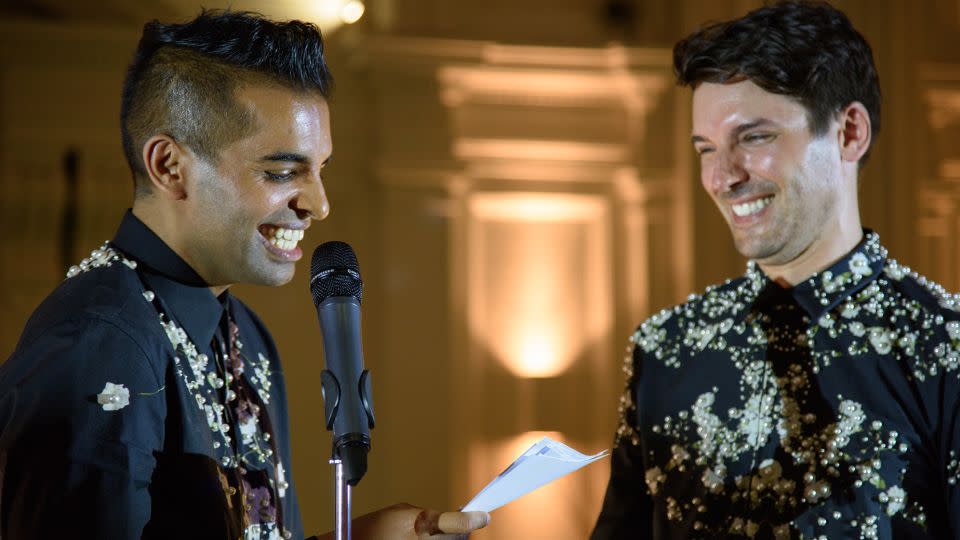
From there, Suki’s relationship with his parents “slowly rebuilt.” And having his parents present for his wedding day in 2016 felt momentous and moving.
“My parents gave a speech, which was lovely,” says Suki. “Never thought I’d see that – to see my parents on stage giving a speech at my wedding. It was really beautiful.”
By the time they were celebrating their “third wedding,” Suki and Manuel had been together for over 10 years. The couple didn’t think signing marriage papers for the first time would change their relationship. They’d already spoken vows to one another twice before, after all.
But the couple found they really appreciated the weight of the word, “married.”
“Converting to marriage was really symbolic of equality – that we can get married, just like straight couples,” says Suki, who recalls the joy of calling Manuel his “husband” for the first time.
Supporting each other
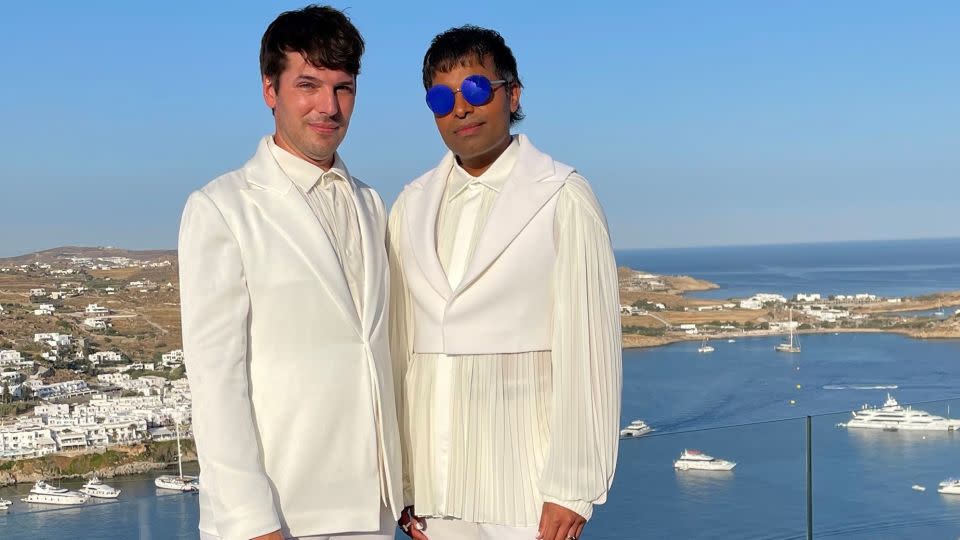
When Germany legalized gay marriage in 2017, Suki suggested it was time for marriage number four.
But Manuel thinks they’ve hit the marriage quota – at least for now.
“I’m still working on him,” says Suki, laughing.
In the meantime, Suki and Manuel are enjoying life together living on the island of Jersey, in the English Channel.
During the pandemic, the longtime Londoners began to dream of living by the sea and they moved first to Bournemouth, on England’s south coast, and then to the largest Channel Island, to a home with a seaview.
Life in Jersey has marked a shift of gears, but work still takes Manuel and Suki to London and New York regularly.
After his early career success, Suki founded his own recruitment firm, Audeliss, in 2011. This organization, which now has headquarters in the UK and the US, describes itself as “committed to leveling the field for executive and non-executive opportunities for women, people of color, and LGBTQ+ candidates.”
Suki’s also the founder and CEO of a consultancy called INvolve, which champions diversity and inclusion in business. In 2019, Suki was awarded an Order of the British Empire, an honor bestowed by royalty, for services to diversity in business.
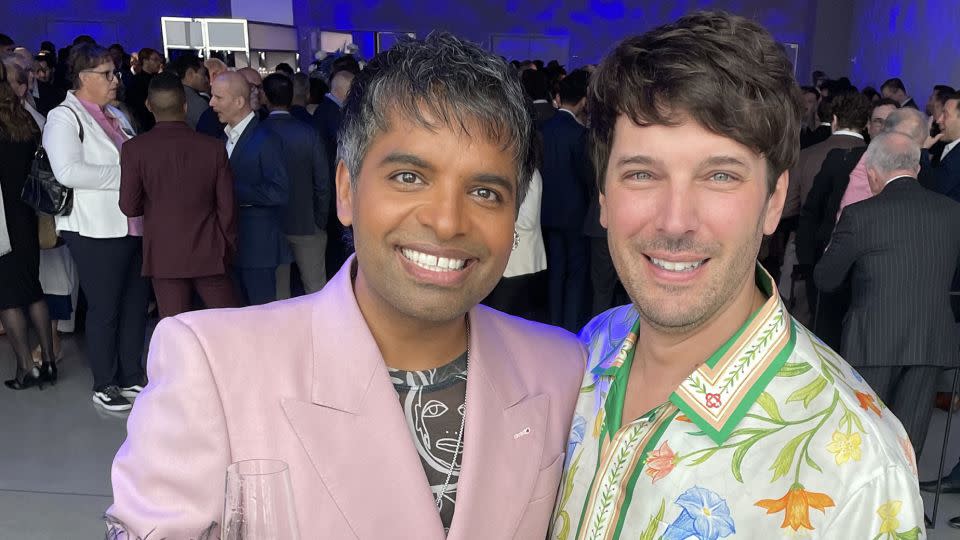
Throughout it all, Manuel’s been at his side, and Manuel says Suki always supports him in return.
“We are each other’s biggest cheerleaders,” Manuel says.
In 2020, Manuel joined Suki at Audeliss. The couple enjoy working together, and in between their busy jobs, find time for seaside walks in Jersey and vacations across the globe. They recently spent time in Mumbai and the Maldives, which Suki calls an “incredible experience.”
It’s in moments like those – sitting on golden beaches with his husband by his side – that Suki realizes his younger self would never believe his life today.
He’s living a reality his teenage or twentysomething self couldn’t conceive of, he says.
“I’m married, been together for 18 years with the same guy, we now live in Jersey by the sea,’” says Suki. “I never thought I’d get married, never thought that was an option for me.”
Manuel echos this: “Marriage wasn’t necessarily something I would think I would ever be able to have.”
“Now I like to tell people I’ve had three weddings – but always to the same person.”
Their happiness is something Suki and Manuel strive never to take for granted.
“I always think about how I’d feel if he wasn’t there,” said Suki. “I’d be so sad.”
“It’s quite special to meet somebody where you feel, ‘This is a person I want to be with, this is my person. A person I want to spend the rest of my life together with,’” agrees Manuel. “And then to develop plans together. We love traveling. We already have that. We want to do things together. And so I think it’s a mix of happiness, excitement and just feeling positive about the future.”
For more CNN news and newsletters create an account at CNN.com


